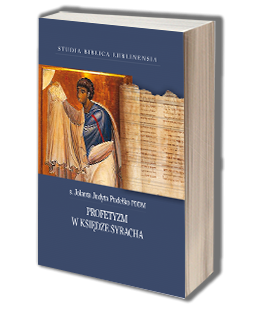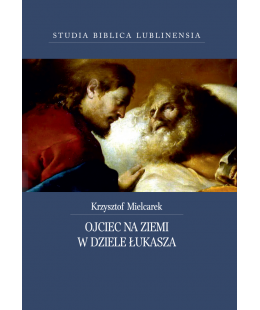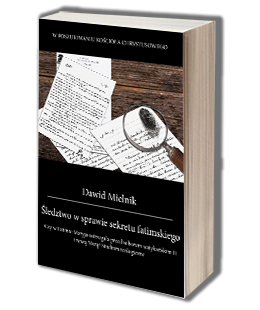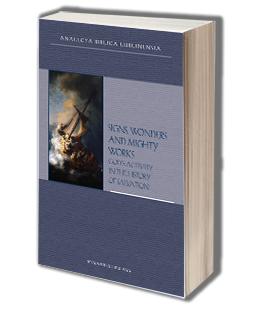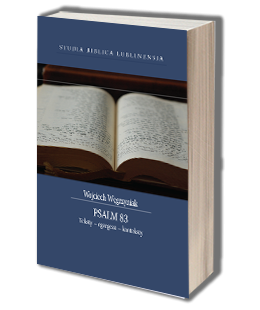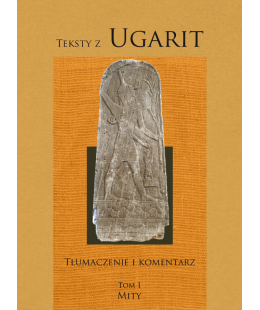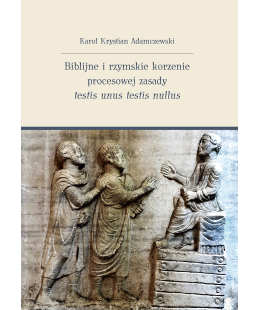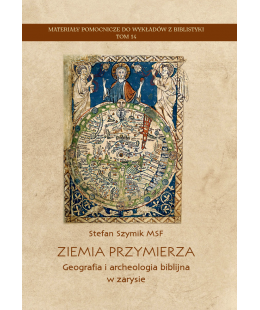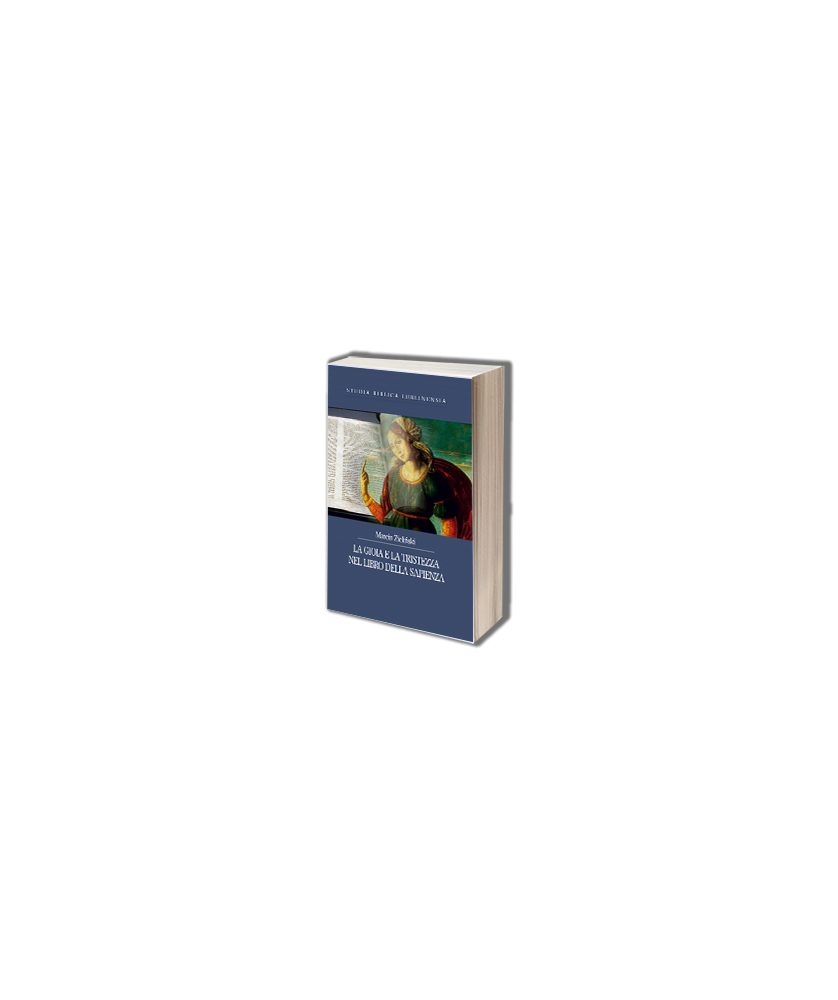
La gioia e la tristezza nel Libro della Sapienza
Studia Biblica Lublinensia XXII
Marcin Zieliński
ISBN: 978-83-8061-895-4
Strony: 318
Format: B5
Rok wydania: 2020
Contents
List of Abbreviations
Introduction
1. Status quaestionis
2. Structure and method
2.1. General introduction to the theme of joy and sadness
2.2. An analysis of the selected texts and reference to the Hellenistic world
2.3. The theological dimension of joy and sadness
Chapter I
Joy and sadness in the Old Testament and Stoicism
1. The concept of joy in the Old Testament
1.1. General introduction
1.2. Terminology related to the concept of joy
1.3. The causes of joy
1.4. The subjects experiencing joy
1.5. A biblical example
2. The concept of sadness in the Old Testament
2.1. General introduction
2.2. The causes of sadness
2.3. The subjects experiencing sadness
2.4. A biblical example
3. The concepts of joy and sadness in Stoicism
3.1. Introduction
3.2. The concept of man in Stoicism
3.3. Stoic ethics
3.4. The concept of virtue
3.5. The concepts of joy and sadness
Chapter II
Joy in the Book of Wisdom
1. Joy as the fruit of the relationship between the sage and Wisdom
1.1. Wisdom - the source and mother of all good things (7:12)
1.1.1. The literary composition of Wis 7:7-12
1.1.2. The analysis of the vocabulary
1.1.3. All good things acquired with wisdom and led by her
1.1.4. Wisdom as a source of all important things
1.1.5. The Stoic and Hellenistic context
1.2. The presence of Wisdom as a source of joy (8:16.18)
1.2.1. The literary composition of Wis 8:10-16
1.2.2. The context of Wis 8:16
1.2.3. The analysis of the vocabulary in Wis 8:16
1.2.4. Wisdom - a cause of joy in public and private life
1.2.5. The Hellenistic context
1.2.6. The literary composition of Wis 8:17-21
1.2.7. The analysis of the vocabulary
1.2.8. The relationship between a virtuous life and joy
1.2.9. The Hellenistic context
2. Joy resulting from a righteous and virtuous life
2.1. The blessed end of the righteous (2:16)
2.1.1. The literary composition of Wis 2:10-16
2.1.2. The analysis of the text
2.1.3. The theological dimension and Hellenistic context
2.2. Blessed are the barren woman and the eunuch - praise of virtue (3:13-15)
2.2.1. The literary composition of Wis 3:13-15
2.2.2. The analysis of the text
2.2.3. The relationship between virtuous life and joy
2.2.4. The Hellenistic context
2.3. The Israelites called fortunate by the Egyptians (18:1-4)
3.3.1. The literary composition of Wis 18:1-4
3.3.2. The analysis of the vocabulary in Wis 18:1
3.3.3. The causes of suffering
3. The apparent joy of the godless
3.1. The godless attempt to experience joy (2:6-9)
3.1.1. The structure and composition of Wis 2:6-9
3.1.2. The analysis of the text
3.1.3. The biblical and Hellenistic context
3.2. False joy in the context of idolatry (13:3 14:28)
3.2.1. The literary composition of Wis 13:3-5
3.2.2. The analysis of the text
3.2.3. The biblical context
3.2.4. The literary composition and context of Wis 14:27-31
3.2.5. The analysis of the vocabulary
3.2.6. The biblical and Hellenistic context
Chapter III
Sadness in the Book of Wisdom
1. The sadness caused by death
1.1. Death as the primary cause of sadness (2:1)
1.1.1. The context and composition of Wis 2:1a-5
1.1.2. The analysis of the text
1.1.3. The theological dimension and Hellenistic context
1.2. The sadness of the godless at the moment of the eschatological judgement (4:17-20 5:1-3)
1.2.1. The literary composition of Wis 4:17-20
1.2.2. The analysis of the vocabulary
1.2.3. The theological dimension and Hellenist context
1.2.4. The literary composition of Wis 5:1-3
1.2.5. The analysis of the vocabulary
1.2.6. The interpretation of παρρησία
1.2.7. The interpretation of πόνος
1.2.8. The theological dimension
1.3. The death of the firstborn and the suffering of the Egyptians (18.10.11.19 19.3)
1.3.1. The literary composition of Wis 18:5-25
1.3.2. The analysis of the vocabulary in Wis 18:10.11.19
1.3.3. The theological significance
1.3.4. The composition of Wis 19:1-5
1.3.5. The analysis of the vocabulary in Wis 19:3
1.3.6. The biblical and Hellenistic context
2. The sadness caused by idolatry and sin
2.1. The contempt of Wisdom as the cause of sadness (3:11)
2.1.1. The literary composition and context of Wis 3:11
2.1.2. The analysis of the vocabulary
2.1.3. The biblical and Hellenistic context
2.2. The idolaters condemned to suffer (13.10 14:15 15:14)
2.2.1. The literary composition and context of Wis 13:10-19
2.2.2. The analysis of Wis 13:10 and its theological meaning
2.2.3. The literary composition of Wis 14:15-21
2.2.4. The analysis of the vocabulary and its theological sense
2.2.5. The literary composition of Wis 15:14-19
2.2.6. The analysis of the vocabulary and theological significance
2.3. The Egyptians’ sufferings caused by sin (11.12 12.27)
2.3.1. The structure and context of Wis 11:11
2.3.2. The analysis of the vocabulary
2.3.3. The theological significance
2.3.4. The literary composition of Wis 12:23-27
2.3.5. The analysis of the vocabulary
2.3.6. The theological significance
3. The apparent sadness of the persecuted upright
3.1. Does the persecuted upright man suffer? (Wis 3-4)
3.2. Does Wisdom comfort the upright? (Wis 8:9)
3.2.1. The structure and context of Wis 8:9
3.3.2. The analysis of the words and the interpretation of παραίνεσις
Chapter IV
The concepts of joy and sadness in the Book of Wisdom
1. The intrinsic relation between the emotions of joy and sadness
1.1. The positioning of lexemes in the structure of the book
1.2. The structural relations between joy and sadness
2. The importance of the historical context for understanding the author’s thought
Conclusion
Summary. Joy and Sorrow in the Book of Wisdom
Bibliography
Index of Modern Authors
Index of Biblical References
Index of Non Biblical Sources
Klienci, którzy kupili ten produkt, kupili także:
-
Profetyzm w Księdze SyrachaCena 35,00 zł
-
Ojciec na ziemi w dziele ŁukaszaCena 60,00 zł
-
Śledztwo w sprawie sekretu...Cena 55,00 zł
-
Signs, Wonders and Mighty Works....Cena 40,00 zł
-
Psalm 83. Teksty-egzegeza -...Cena 30,00 zł
-
Teksty z Ugarit. Tom I Mity, Tom...Cena 180,00 zł
-
Biblijne i rzymskie korzenie...Cena 49,00 zł
-
Ziemia Przymierza. Geografia i...Cena 39,00 zł



